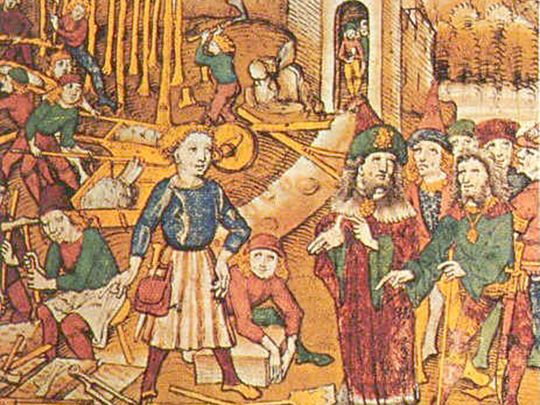
What are your resolutions for the New Year? You may be surprised how they closely resemble those of people in the Middle Ages.
Click start to play today’s Spell It, where we ‘seek’ out the lifestyle changes that people in the medieval era promised to embrace at the beginning of the year, and compare them to today’s most popular resolutions.
According to a January 2023 report in the US-based history news website History Extra, people in medieval Europe saw January as a time for looking forwards, from as early as the 10th century. On the last day of 1661, for instance, English diarist Samuel Pepys recorded the words: “I have newly taken a solemn oath about abstaining from plays…”.
So, it seems medieval people may have understood modern-day desires to create new habits or change certain behaviours in the New Year. Here are some ways in which, our desire to improve our health and lifestyle match:
1. Improvement in diet
Although they were less concerned about body size than us, people in the Middle Ages recognised obesity as a health issue. French surgeon Guy de Chauliac wrote that fatness became an issue when a person "could no longer walk normally, nor touch the ground, nor put on his shoes on account of the girth of his stomach, nor even breathe without difficulty”. Some wealthy people even commissioned regimes to help them lose weight. Foods were classified in humoral terms – hot or cold, and wet or dry – and the best kinds of food were both warm and moist, like chicken, but surprisingly, uncooked fruits were considered unhealthy.
2. More exercise
The benefits of exercise for physical and mental health has long been acknowledged. Most regimens in the medieval age focused on moderate exercise, such as walking or riding. In 1315, for instance, Valencian physician Peter Fagarola advised his sons to go for a morning and evening walk. He told them that if it was cold, they should run, and if it was raining, they should exercise at home by jumping, climbing stairs, and lifting “a big heavy stick like a sword”.
3. Get more sleep
The pursuit of a good night’s rest is not a new phenomenon. Medieval people shared our concerns that chronic sleep deprivation could cause illness – they also believed it shortened one’s lifespan. Medieval doctors agreed that eight hours of sleep every night was best, and they also advised rising early, avoiding naps and sleeping in darkened rooms, to improve the quality of sleep.
4. Reduce stress
Although mental health is commonly acknowledged as a modern idea, medieval people knew that managing their emotions was key to a happy, healthy life. Negative emotions like anger, anxiety and sadness, were thought to upset the body’s humoral balance and damage its physical health. Physicians often urged their patients to engage in activities that made people happy, like travel, spending time with friends, and listening to music.
What do you think of these similarities? Play today’s Spell It and tell us at games@gulfnews.com.






